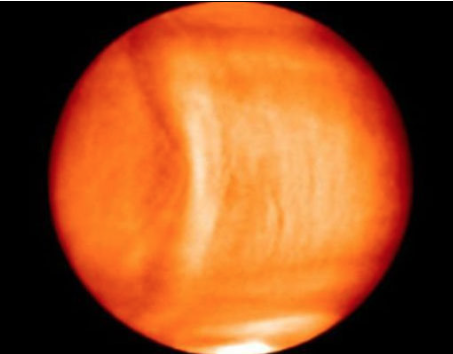
Image courtesy: JAXA
Despite satellites whose jobs are to determine the 'whats and whys' of the solar system, there are still more questions left unanswered than there are that are answered such as: how can Venus withstand the gush of sulphuric acid clouds that are spinning faster than the planet itself?
As of now, there are numerous spacecrafts circling around in space conducting probes on the different planets that comprise our solar system. Among them, the Akatsuki probe—a Japanese space mission—that is centered around investigating Venus has made an amazing discovery.
The spacecraft spotted a massive bow-shaped 'bulge' in the upper atmosphere of the planet, and astronomers are trying to explain how it could withstand the gush of sulphuric acid clouds that are spinning faster than the planet itself.
The giant wave became one of the most prominent features in the planet’s atmosphere for four days in December 2015.
The astronomers' best guess is that the strange, 10,000-km (6,214-mile) structure is the result of what could be the largest gravity wave ever witnessed in the solar system, however, scientists didn’t think gravity waves could form this high up in the atmosphere.
Scientists at the Japan Aerospace Exploration Agency (JAXA) are of the belief that the wave was produced by surface winds when they slammed into the 4,500-meter-high (14,764 feet) Aphrodite Terra mountain range near the planet’s equator.
“Such stationary waves can have a very large scale, perhaps the greatest ever observed in the solar system,” the researchers write in the journal Nature Geoscience. The unusual waves may even be powerful enough to affect the climate on the planet, the scientists add.
The Japanese space agency's Akatsuki probe was launched in May, 2010 to explore Venus' climate. It reached its destination less than seven months later but technical troubles meant it failed to pop into orbit.
Only five years later was it maneuvered into an elliptical orbit—and then its Longwave Infrared Camera saw the wave.

